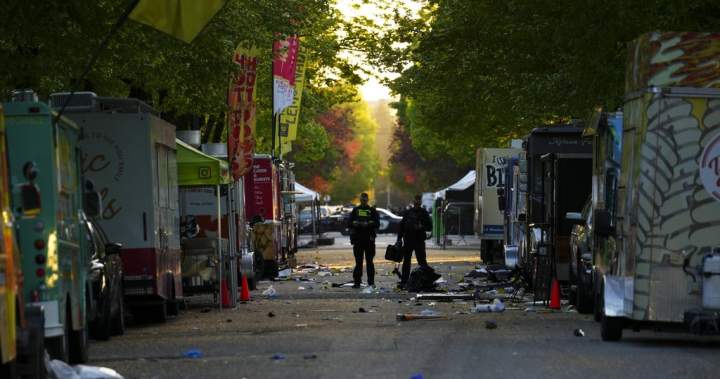The community group Filipino BC is calling on all levels of government to step up and commit direct and long-term funding to help victims of the Lapu Lapu Festival and their families.
According to the organization, no level of government has committed to dedicated funding for programs and services to aid those most affected by the April 26 tragedy.
Eleven people were killed and dozens more injured when an SUV drove into the crowd at the Lapu Lapu Festival in Vancouver.
“I think we’re still hearing that the acuity of need for basics is still quite high,” Kristina Corpin-Moser, executive director of Filipino BC, told Global News.
“I think also what we’ve noticed is that by and large, it has been the community that has led the emergency and recovery response. And so while the United Way fundraised $2 million to fund 40 charities and non-profits, there’s really a role that the government needs to play in leaning in instead of waiting for communities and non-profits to reach out.”
Corpin-Moser says families affected by the tragedy are struggling to pay rent, put food on the table and access culturally appropriate mental health supports.
She said she has not been able to have a serious conversation with the provincial government or the City of Vancouver.
“This is where the government really needs to have its ear to the pavement to hear what’s happening on the ground,” she added.
Following the tragedy, people around the world stepped up to donate $2 million for the United Way BC Kapwa Strong Fund.

Get breaking National news
For news impacting Canada and around the world, sign up for breaking news alerts delivered directly to you when they happen.
Corpin-Moser told Global News that the money raised directly supported those most impacted, along with community programs, but there were many people present that day who would not be classified as the most heavily impacted victims.
“We also have hundreds of people who were witnesses on the day,” she said.
“We have people in the neighbourhood who need access to support. We have, you know, people who held victims’ hands as they died. These people also need assistance and they don’t necessarily qualify for EI or for these other benefit programmes.
“This is where we say our role should really be in tertiary and secondary support.”

In a statement to Global News, the City of Vancouver said it has helped facilitate conversations between victims, families and community organizations and the Vancouver Police Department.
“While the City of Vancouver does not have the jurisdiction to plan and deliver mental health services, the city does already provide funding toward victim services through the Vancouver Police Department,” the statement read.
“The city has expressed a strong interest in seeing community-directed programming to support victims, their families, and impacted community members. The most appropriate channel for funding requests of this nature is the city’s social and cultural granting program.”
The city says it encourages Filipino BC to apply to the program if they wish.
B.C.’s Solicitor General, Nina Krieger, confirmed to Global News on Friday that 180 claims have been paid through ICBC to the amount of $2 million.
She said 95 applications have been received through the province’s Victims of Crime program and 93 of those have been approved.

Corpin-Moser said they want to see a more coordinated approach across all levels of government.
“Folks were at the table early on and then nothing really came of it,” she said.
“And so I think since then, you know, we’ve heard a lot of promises, politicians coming through, taking photographs, telling them how the Filipino community is a community that cares for people. So we’re going to care for them.
“Where’s that care, right? And I think the absence is noticeable now that we’re five months out and we still have people who can’t access basic resources.”
© 2025 Global News, a division of Corus Entertainment Inc.
‘Where’s that care?’ Group says Lapu Lapu victims need more government support





